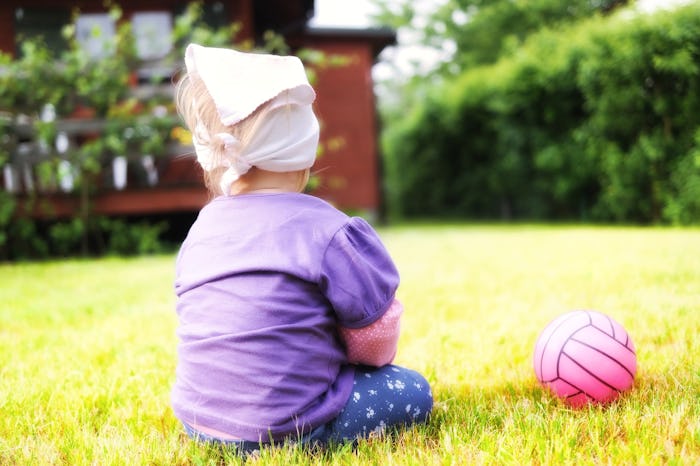Life

What You Teach Your Toddler When They Play Solo
Once my son got mobile, we spent a lot of time baby-proofing our house. We put everything not fit for a baby’s mouth in latched cabinets or moved them up higher, then hid all furniture he could climb. When we moved his toys into those vacant low shelves, a cool thing happened: he started entertaining himself for longer stretches of time, because he could reach more things on his own. He also seemed noticeably prouder of himself. One of the things toddlers learn when they play on their own is the pride of doing things for yourself.
Babies and toddlers are little problem-solving machines. They live to learn about the world through trial and error while they play. However, it can be hard to just let them play when we're concerned about their safety, or think they should be doing something else more “educational” or whatever, or once they've gotten used to us entertaining them because that's how things have always gone down in the past.
Letting toddlers play on their own may seem like no big deal (or maybe even like something that shouldn't be allowed), but it's actually a really important opportunity for them, for the following reasons (among lots of others):
You Consider The Space You're In A Safe Place…
Toddlers look to us for clues about how to feel about their surroundings and other people around them. If we seem apprehensive or unsure, they learn to consider the space (or people) around them unsafe. But if we allow them some free rein, that tells them that where we are at the moment is safe.
...And Help Them Start To Tell The Difference Between Safe And Unsafe Places
Kids are smart. They know that there are some times, like when we're outside or somewhere crowded, where we hold on to them and don't let them roam very far. And there are other times, like when we're at home or school or a trusted friend or family member’s house, where we let them play as they choose.
That helps them start to notice patterns — “When we're inside a place with toys and gates on the stairs, I can play by myself. When we're out near cars, Mama holds me close or straps me into my stroller” — that help them figure out how to identify safe versus unsafe places, and how to behave accordingly.
They Are Capable Of Entertaining Themselves…
Letting them play on their own is a vote of confidence in their abilities to keep themselves occupied without your help.
...And You Don't Exist Solely To Entertain Them
Letting them play on their own also sends them the message that while you like to play with them sometimes, you don't need to. You have other things to do and other reasons to be.
They Don't Always Need Other People In Order To Have Fun
Connection with other people is so important. Then again, so is having time to ourselves. Letting toddlers play on their own teaches them that it's perfectly OK to do your own thing sometimes. You don’t always need to be part of a group.
You Trust Them To Make Good Choices…
Letting them play on their own means that we think they can choose what to do and what not to do, and that we believe they can do things for themselves (within reason) without hurting themselves or anything else.
…And You Respect What They Choose To Do
When we interrupt what little kids are doing to direct their attention to a different activity, or stop what they were doing to engage them in a game we choose, we send the message that what we choose for them is more worthwhile than what they choose. When we let them play on their own (and give them a heads up before playtime will need to end so we can move on to something else that has to happen), we teach them that what they're doing is worthy, and that they're capable of making good choices with their time.
You Think They're Capable Of Directing Their Own Attention
Kids who are allowed to play on their own sometimes learn that they can trust their own minds to figure out what to focus on and imagine things to do. When we constantly make those choices for them, and entertain them all the time, they learn that they need an adult to tell them what to do all the time.
You Trust Them To Be Able To Figure Out Some Of Their Own Problems
Playtime presents lots of little problems to be solved: figuring out how to use toys that have subtle limits (like shape sorters), figuring out how to balance things (like stacking towers), and so forth. Letting them work through those problems on their own without immediately jumping in teaches them that you think they can handle it, which helps them believe in their own ability to solve their own problems, too.
Playing Separately At One Time Doesn't Mean You Can't Play Together Another Time
By letting them play on their own sometimes, but playing with them other times, we let them know that life isn't all or nothing. They can be on their own sometimes, and it doesn't mean you're rejecting them or that you’ll never play together again. It just means you're not playing together right now, and that can be totally OK.